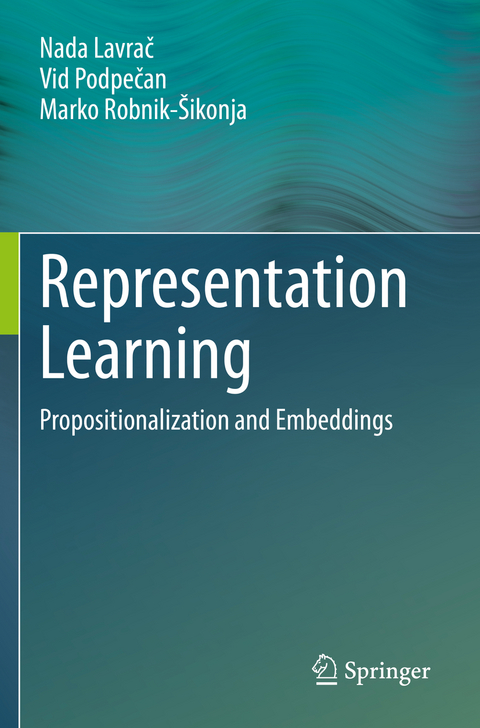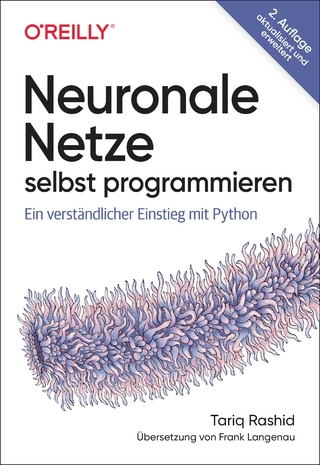
Representation Learning
Springer International Publishing (Verlag)
978-3-030-68819-6 (ISBN)
Prof. Nada Lavrac (Jozef Stefan Institute, Slovenia) is Senior researcher at the Department of Knowledge Technologies at JSI (was Head of Department in 2014-2020), and Full Professor at University of Nova Gorica and International Postgraduate School Jozef Stefan (was Vice-Dean in 2016-2020). Her research interests are machine learning, data mining, text mining, knowledge management and computational creativity. She was chair of several conferences ICCC 2014, ILP 2012, AIME 2011, ..., co-chair of conferences including SOKD 2008-2010, ILP 2008, IDA 2007, DS 2006, ..., keynote speaker at KI2020, ADBIS2019, ISWC 2017, LPNMR 2015, JSMI 2014, ... She is/was member of editorial boards of Artificial Intelligence in Medicine, AI Communications, New Generation Computing, Applied AI, Machine Learning Journal and Data Mining and Knowledge Discovery. She is ECCAI/EurAI Fellow, was vice-president of ECCAI (1996-98), and served as member of the International Machine Learning Society board and Artificial Intelligence in Medicine board. Vid Podpecan, PhD, is a research associate at the Department of Knowledge Technologies at the Jozef Stefan Institute. He obtained his BSc in computer science from the University of Ljubljana in 2007, and his PhD from the Joz ef Stefan International Postgraduate School in 2013. His research interests include machine learning, computational systems biology, text mining and natural language processing, and robotics. He co-authored a scientific monograph and published the results of his research in more than 50 scientific publications. He is also actively involved in promoting STEAM with a focus on robotics, programming, and art for which he received an award by the Slovene Science Foundation. Prof Marko Robnik-Sikonja is Professor of Computer Science and Informatics at University of Ljubljana, Faculty of Computer and Information Science. His research interests span machine learning, data mining, natural language processing, network analytics, and application of data science techniques. His most notable scientific results are from the areas of feature evaluation, ensemble learning, explainable artificial intelligence, data generation, and natural language analytics. He is (co)author of over 150 scientific publications that were cited more than 5,000 times, and three open-source R data mining packages. He participates in several national and international projects, regularly serves as programme committees member of top artificial intelligence and machine learning conferences, and is an editorial board member of seven international journals.
Introduction to Representation Learning.- Machine Learning Background.- Text Embeddings.- Propositionalization of Relational Data.- Graph and Heterogeneous Network Transformations.- Unified Representation Learning Approaches.- Many Faces of Representation Learning.
| Erscheinungsdatum | 12.07.2022 |
|---|---|
| Zusatzinfo | XVI, 163 p. 46 illus., 38 illus. in color. |
| Verlagsort | Cham |
| Sprache | englisch |
| Maße | 155 x 235 mm |
| Gewicht | 284 g |
| Themenwelt | Informatik ► Datenbanken ► Data Warehouse / Data Mining |
| Informatik ► Theorie / Studium ► Algorithmen | |
| Informatik ► Theorie / Studium ► Künstliche Intelligenz / Robotik | |
| Mathematik / Informatik ► Mathematik ► Analysis | |
| Schlagworte | data fusion • data structures • Deep learning • Embeddings • Feature Construction • heterogeneous data mining • information networks • machine learning • Networks • Ontologies • open science • propositionalization • Relational Data Mining • relational learning • semantic data mining • texts |
| ISBN-10 | 3-030-68819-4 / 3030688194 |
| ISBN-13 | 978-3-030-68819-6 / 9783030688196 |
| Zustand | Neuware |
| Informationen gemäß Produktsicherheitsverordnung (GPSR) | |
| Haben Sie eine Frage zum Produkt? |
aus dem Bereich


